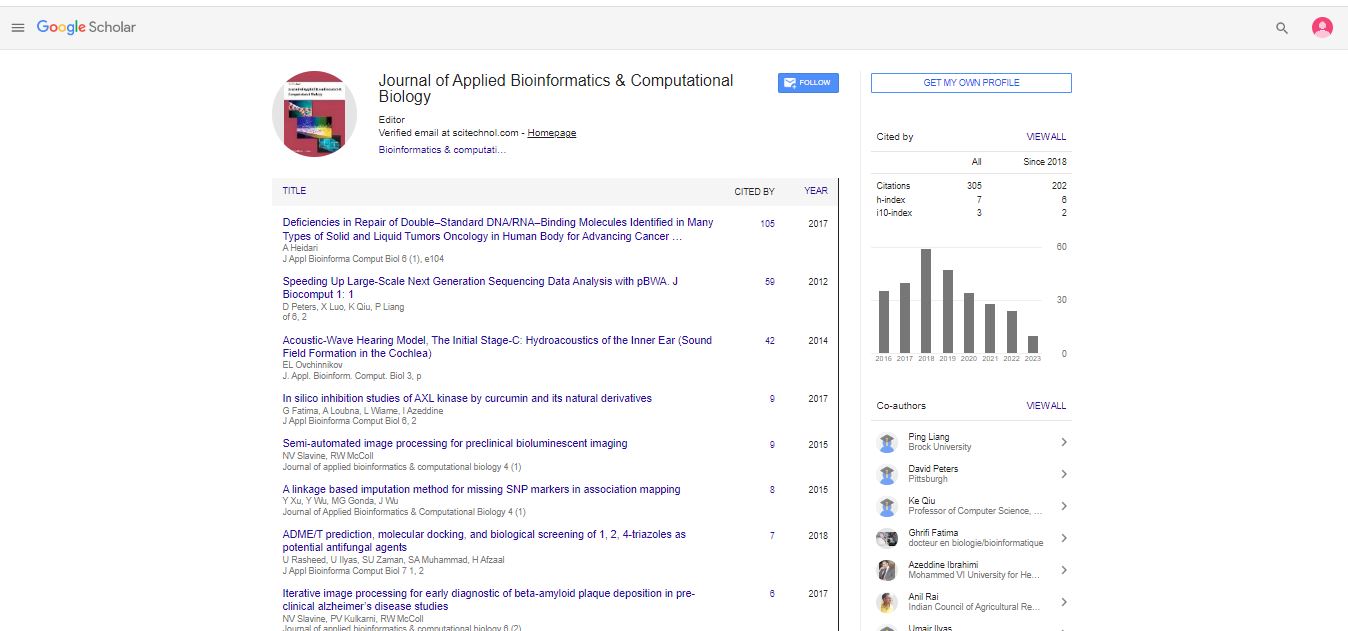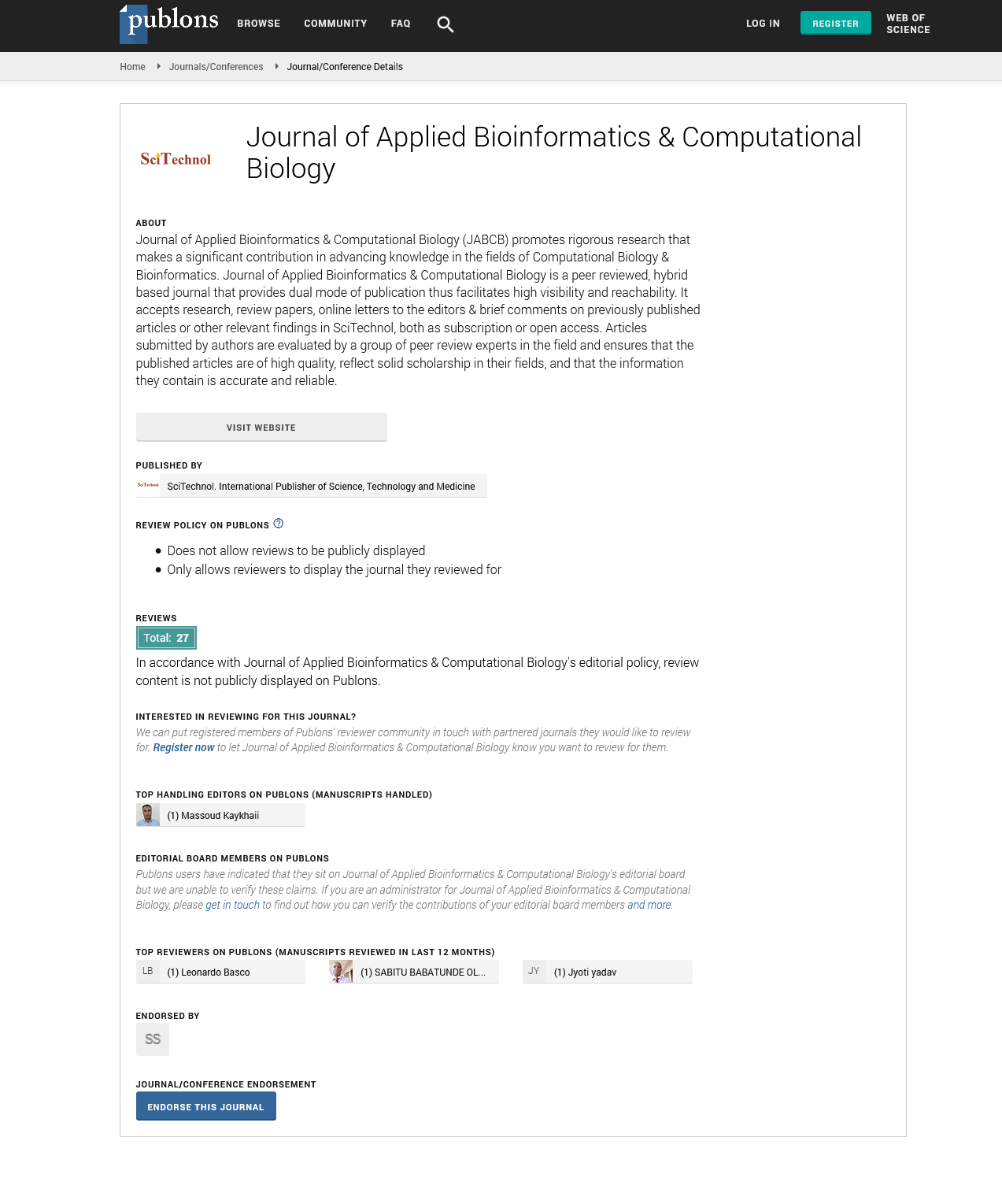Opinion Article, Vol: 12 Issue: 5
Genomic Big Data: Challenges and Opportunities in Computational Biology
Tessema Christoffels*
1Department of Molecular and Human Genetics, Baylor College of Medicine, Houston, USA
*Corresponding Author: Tessema Christoffels,
Department of Molecular and
Human Genetics, Baylor College of Medicine, Houston, USA
E-mail: Christoffels@tessema.edu.in
Received date: 27 September, 2023, Manuscript No. JABCB-23-120188;
Editor assigned date: 29 September, 2023, Pre QC No. JABCB-23-120188 (PQ);
Reviewed date: 13 October, 2023, QC No. JABCB-23-120188;
Revised date: 20 October, 2023, Manuscript No. JABCB-23-120188 (R);
Published date: 27 October, 2023, DOI: 10.4172/2327-4360.1000286
Citation: Christoffels T (2023) Genomic Big Data: Challenges and Opportunities in Computational Biology. J Appl Bioinforma Comput Biol 12:5.
Description
The field of genomics has witnessed unprecedented growth in recent years, fueled by advances in high-throughput sequencing technologies. This surge in genomic data production has given rise to what is now known as genomic big data. The sheer volume, complexity, and diversity of genomic data present both challenges and opportunities in the realm of computational biology. This essay explores the intricacies of genomic big data, delving into the challenges it poses and the transformative opportunities it offers in advancing our understanding of biology.
One of the foremost challenges in genomic big data is the sheer volume of information generated. High-throughput sequencing technologies can produce massive datasets, placing a strain on storage infrastructure. Managing, storing, and retrieving these colossal datasets require sophisticated storage solutions and efficient data management strategies. Genomic data is multidimensional, spanning across various biological layers such as genomics, transcriptomics, and epigenomics. Integrating these diverse datasets poses a significant challenge. Computational methods must be developed to seamlessly integrate and analyze data from different sources, facilitating a holistic understanding of biological processes. Analyzing genomic data requires substantial computational power. The complexity of algorithms and the need for parallel processing demand highperformance computing resources. Ensuring the availability and accessibility of such resources for researchers is crucial to harness the full potential of genomic big data.
Genomic data is prone to errors and variations introduced during sequencing. Ensuring data quality is a persistent challenge. Standardizing data formats and developing quality control measures are imperative to enhance the reliability and reproducibility of genomic studies. Genomic data often contains sensitive information about individuals. Protecting privacy and addressing ethical concerns surrounding the use of this data is a critical challenge. Striking a balance between advancing research and safeguarding individual privacy requires robust data governance frameworks and ethical guidelines. Genomic big data serves as the foundation for precision medicine, tailoring medical treatments to individual genetic profiles. Analyzing large-scale genomic datasets enables the identification of genetic markers associated with diseases, paving the way for personalized and more effective therapeutic interventions. The wealth of genomic data provides opportunities for discovering biomarkers indicators of biological processes or disease states. Identifying reliable biomarkers contributes to early disease detection, prognosis, and the development of targeted therapies.
Genomic data accelerates drug discovery by enabling a deeper understanding of the molecular mechanisms underlying diseases. Targeted therapies can be designed based on genomic insights, expediting the drug development process and increasing the likelihood of success. Genomic big data facilitates functional genomics research, uncovering the roles of genes and their interactions in biological processes. This knowledge is instrumental in deciphering the complexity of living systems and understanding the molecular basis of various diseases. Large-scale genomic studies allow researchers to explore population-level genetic variations. Understanding genetic diversity and the distribution of genetic traits among populations aids in unraveling the evolutionary history of species and provides insights into disease susceptibility across different populations. Genomic big data represents a double-edged sword in the field of computational biology, presenting both challenges and transformative opportunities. Overcoming the challenges requires concerted efforts in developing robust computational infrastructure, data management strategies, and ethical frameworks. On the flip side, the opportunities presented by genomic big data are immense, ranging from personalized medicine to innovative discoveries in functional genomics and drug development. As computational biology continues to evolve, the effective harnessing of genomic big data will be pivotal in advancing our understanding of the intricacies of life at the molecular level.
 Spanish
Spanish  Chinese
Chinese  Russian
Russian  German
German  French
French  Japanese
Japanese  Portuguese
Portuguese  Hindi
Hindi 
